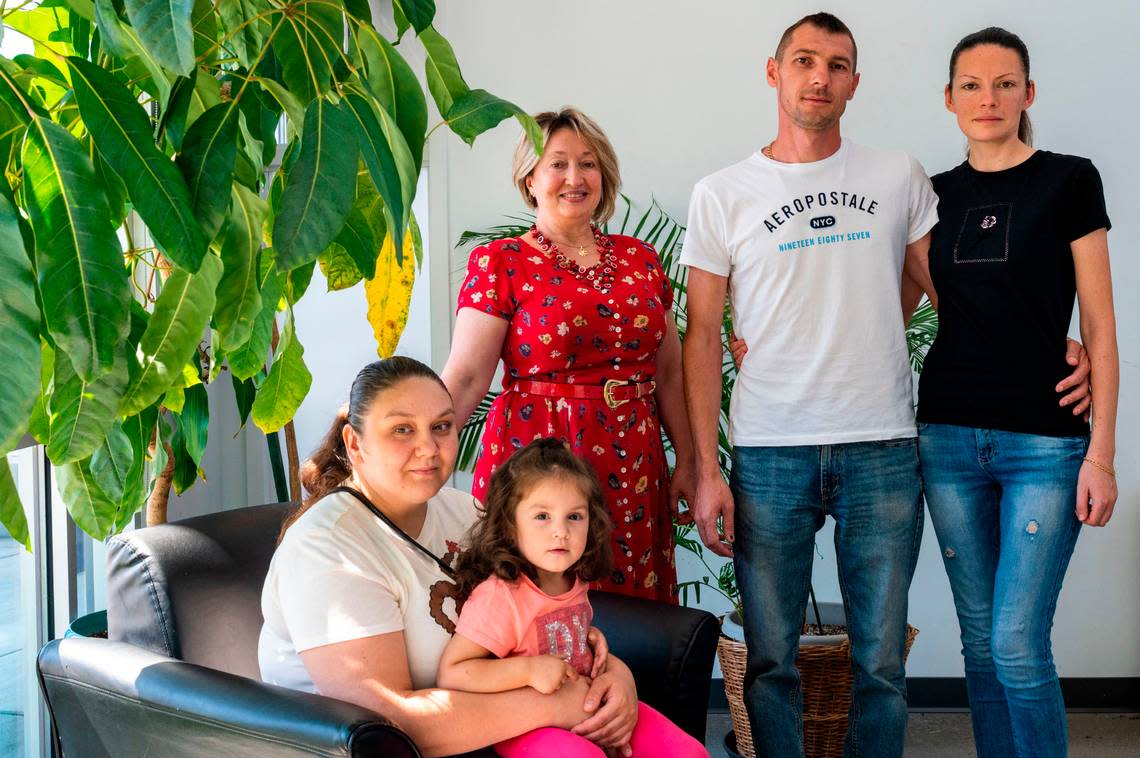A ‘huge influx’ of Ukrainian immigrants found safety in Tacoma. Now some hope to stay
It took Victor Kovaliou and his family 12 long days to get to Tacoma. He remembers the trip vividly.
After leaving his hometown of Kherson, Ukraine in April, where the 33-year-old worked as a mechanical engineer, Kovaliou, his wife Dana and their daughter Karina made stops in Asia, Europe and Africa before boarding a flight to Mexico. From there, the family traveled to the U.S. border, where they legally entered the country and hopped on a bus that took them up the West Coast. They have relatives in Tacoma, Kovaliou said.
The journey was “hard on the family,” Kovaliou told The News Tribune on Wednesday, through an interpreter at Tacoma Community House. But he’s glad they’re here, and now — unlike when he first arrived — he’s hoping to stay.
From his perspective as an immigrant displaced by bloody war, the United States feels like “a country of big possibilities,” he said.
His home of Kherson has been occupied by Russian forces, he said..
“I feel like my child has a future here,” Kovaliou explained.
The family is far from alone. Since war broke out between Russia and Ukraine roughly six months ago, thousands of Ukrainians have sought refuge in Washington, according to state Department of Social Health Services data.
Many of them, according to local immigration specialists, have found a home in Tacoma and Pierce County, where large Ukrainian immigrant populations already existed.
Jason Scales, the executive director of Tacoma Community House, said the nonprofit — which offers English classes and other forms of assistance to immigrants — has seen a significant increase in the number of Ukrainians looking for help in recent months.
Like Kovaliou, many are coming to terms with a stay in the United States that now seems likely to be much longer than anticipated, Scales said.
“We’ve seen a huge influx of Ukrainians,” Scales said earlier this month. “We’re close to 150 individuals who’ve come through our doors in the last few months. … With our numbers, that’s over 350 family members. What we’ve done in three or four months is what we would have done in a year.”
“For some of the clients that have been here a while now, I think the realization that they’re not here for six months and then going to return to their home has really hit hard,” Scales said.
The influx Scales described is no mirage, according to DSHS officials. Ukrainians have arrived in the United States outside of the standard U.S. Refugee Admissions Program and instead largely through the new federal Uniting for Ukraine program, which complicates the accounting. But according to Sarah Peterson, the Washington State Refugee Coordinator with the Office of Refugee and Immigrant Assistance, Ukrainian applications for cash, food and medical assistance help to tell the tale.
Between January and July, 7,612 Ukrainians received such assistance, Peterson said. The wave truly became noticeable in April, she indicated, when 4,567 Ukrainians received public benefits through DSHS — a massive increase from the roughly 625 that received benefits the month prior.
From April to July — the most current numbers available — DSHS saw an increase of 800 to 1,200 Ukrainians receiving benefits each month, Peterson said.
According to DSHS spokesperson Norah West, applications submitted to the Department of Homeland Security through the federal Uniting for Ukraine program show that Washington is in the top five states across the country for welcoming Ukrainian immigrants. The program requires immigrants to have sponsors already living in the United States. According to West, the highest number of Washington sponsors reside in King, Snohomish, Clark and Pierce counties.

Locally, Svetlana Waer, an immigration specialist at Tacoma Community House, often finds herself assisting new immigrants from Ukraine. Having lived in Washington for more than two decades now, Waer is from the same Ukrainian hometown as Kovaliou, giving her intimate familiarity with what families like his are facing.
Along with learning English, Waer says, one of the biggest challenges facing new Ukrainian immigrants is the often lengthy application process for authorization allowing them to work. Helping families navigate the process is how she spends much of her time.
“It’s been very hard, because people lived in peace for so long. They actually lost everything,” Waer said. “They lost their houses and places to live. They lost their relatives. They lost their jobs. People just left behind everything, and they moved to another country to feel safe and also to keep safe their children.”
Uliana Horniak, a 29-year-old mother of four children, is one of Waer’s clients. Horniak’s family arrived in Pierce County in April, and have been living at a house in Spanaway with her sister and her family.
Horniak’s husband is a mechanic by trade who’s hoping to find work soon, she said.
“The kids will go to school, and maybe I’ll go to study somewhere,” Horniak told The News Tribune through an interpreter. “My husband is volunteering at church now, but when we obtain work authorizations it will be different. We have four children, and we need to feed them.”
It’s a similar story for Kovaliou. He’s been floored by the assistance his family has received in the United States — including the apartment on Hilltop the family recently moved into — but he’s eager to take the next step. He’s increasingly convinced that what’s best for his family is putting down roots in the community that has so warmly welcomed him, he said.
Four months ago, it’s a future Kovaliou never could have imagined.
“From the beginning, if somebody would ask me this question I would say, ‘Yes, I would like to go back,’ because it’s different countries, and hard for people that don’t speak English that well,” Kovaliou said.
“Now, to go back would be kind of a step back,” he said.
